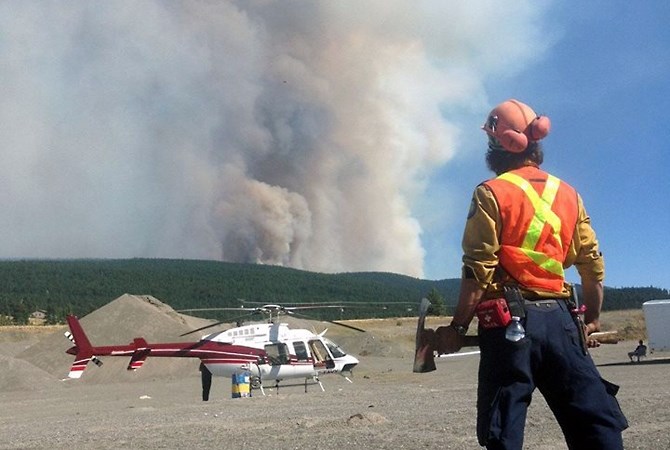
A crew member on site at the Elephant Hill wildfire. There are currently more than 1,400 B.C. contract firefighters and support personnel supporting B.C.'s battle against the province’s wildfire situation. Soon more than 100 additional firefighters from Mexico and the U.S. will arrive to help out.
Image Credit: FACEBOOK/BCForestFireInfo
May 04, 2020 - 7:38 AM
Smoking materials have been deemed the most likely cause of the 2017 Elephant Hill wildfire, which destroyed homes and charred nearly 2,000 square kilometres of land in British Columbia.
But the person behind the massive fire will likely never be known, let alone charged.
"The B.C. Wildfire Service’s fire origin and cause specialists investigated the Elephant Hill wildfire, and their report indicated that the most likely cause of the Elephant Hill wildfire was smoking or smoking materials," a Ministry of Forests, Lands, Natural Resource Operations and Rural Development states.
"The 'smoking materials' classification includes matches, cigars, pipe tobacco, cigarettes and/or marijuana."
The investigation ruled out lightning, escaped campfire, Category 2, Category 3 or Resource Management Open Fire activity, arson/suspicious; juvenile fire setter/fire use; equipment used, railroads, vehicles, and electrical transmission/utility line/pole.
"The B.C. Wildfire Service’s fire origin and cause report was completed in fall 2017 and submitted as part of a larger RCMP investigation into the Elephant Hill wildfire. The RCMP recently concluded its investigation, so the B.C. Wildfire Service can now share its information regarding the cause of this wildfire," the report states.
"The B.C. Wildfire Service and RCMP investigations did not uncover sufficient evidence to identify the person whose actions started the Elephant Hill wildfire. Therefore, it was not possible to lay charges or pursue cost recovery for damages caused by this fire. The B.C. Wildfire Service’s investigation into the Elephant Hill wildfire is now complete and no further action will be taken at this time."
B.C. Wildfire Service data shows the Elephant Hill fire, sparked July 6, 2017, grew to be the largest wildfire in the province that year and at its peak, forced the evacuation of thousands, including the entire community of Cache Creek. The smoke shadow of the blaze was cast wide and left the region under a pall for much of the summer.
A report from the Thompson Nicola Regional District says the fire destroyed 228 structures, including dozens of homes in the communities of Boston Flats, Loon Lake and Pressy Lake.
To contact a reporter for this story, email Kathy Michaels or call 250-718-0428 or email the editor. You can also submit photos, videos or news tips to the newsroom and be entered to win a monthly prize draw.
We welcome your comments and opinions on our stories but play nice. We won't censor or delete comments unless they contain off-topic statements or links, unnecessary vulgarity, false facts, spam or obviously fake profiles. If you have any concerns about what you see in comments, email the editor in the link above.
News from © iNFOnews, 2020